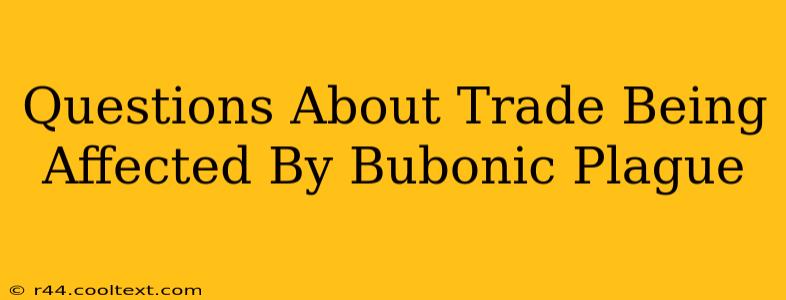The Black Death, a devastating bubonic plague pandemic, ravaged Europe and Asia in the mid-14th century. Its impact extended far beyond the staggering loss of human life; it profoundly reshaped global trade and economic systems. Let's delve into some key questions about this devastating interaction.
How Did the Bubonic Plague Affect Trade Routes?
The plague's spread was intrinsically linked to existing trade routes. The most infamous route, the Silk Road, became a conduit for the disease. The constant movement of people and goods along these established paths facilitated the rapid transmission of the Yersinia pestis bacterium. As the plague took hold in various regions, trade along these vital arteries slowed dramatically, and in some cases, completely ceased. Fear of infection led to quarantines and border closures, disrupting the flow of goods and significantly impacting the economies reliant on these trade networks. The Mediterranean Sea trade routes, crucial for the exchange of goods between Europe and the East, also suffered immensely.
Specific Impacts on Trade Routes:
- Silk Road: The closure of sections of the Silk Road led to shortages of luxury goods like silk, spices, and porcelain in Europe, driving up prices and changing consumer behavior.
- Mediterranean Sea Routes: The disruption of these routes affected the exchange of vital commodities such as grain, textiles, and slaves, triggering widespread economic instability.
What Goods Were Affected By Trade Disruptions?
The impact wasn't uniform across all goods. High-value, long-distance traded items were disproportionately affected. The scarcity of spices, for example, had a significant effect on European cuisine and markets. Similarly, the reduced availability of silk and other luxury goods led to economic hardship for merchants and artisans involved in their production and distribution. The interruption in the flow of grain and other essential foodstuffs had devastating social consequences, contributing to famine and widespread unrest.
The Ripple Effect:
The disruption extended beyond the goods directly affected. The reduced trade in raw materials also hampered the production of various manufactured goods, leading to a chain reaction across industries and economies.
How Did Governments Respond to Trade Disruptions Caused by the Plague?
Governments responded in various ways, often haphazardly and inconsistently. Quarantines were implemented, though their effectiveness varied widely depending on enforcement and understanding of the disease's transmission. Border controls were tightened, further restricting trade. Some governments attempted to manage prices, but these measures often proved ineffective or even counterproductive. The lack of coordinated international response amplified the economic fallout from the pandemic.
Long-Term Governmental Shifts:
The plague also spurred some long-term changes in governmental practices. The crisis highlighted the limitations of existing systems and spurred some innovations in public health and governance, though these changes were slow to materialize.
Did the Bubonic Plague Lead to Lasting Changes in Global Trade?
The bubonic plague undeniably left a lasting mark on global trade. While trade routes eventually reopened, the pandemic fundamentally altered trade patterns and power dynamics. The shift in economic power away from some previously dominant regions, along with new approaches to risk management and trade regulation, reshaped the global economic landscape for centuries to come. The event acted as a catalyst for both short-term disruption and long-term, structural change in the global trading system.
The Aftermath:
The plague's legacy is a reminder of the fragility of global interconnectedness and the devastating consequences of pandemics on trade, economies, and societies. It underscores the importance of international cooperation and preparedness in addressing global health crises.

